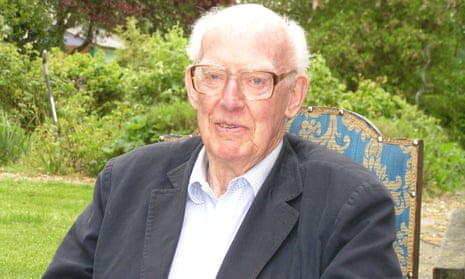Henry Hobhouse, known as Tom, made his mark with a groundbreaking book, Seeds of Change: Five Plants That Transformed Mankind (1985). An exploration of how western man’s discovery, use and trade of sugar, tea, cotton, the potato and quinine transformed the world, it changed the way we understand modern history.
Hobhouse, who has died aged 91, was not a professional historian, botanist or writer, but in succession a sailor, a journalist, a West Country farmer, and county council chair. But his love of debate, insatiable search for facts and inquisitive nature defined all that he did.
Seeds of Change today reads dangerously like a celebration of western imperialism, and a justification of gung-ho free trade; but in 1985, history was taught very much through the lives of great men, and here was a vivid and original appraisal of what had most influenced modern times. It was welcomed by scholars, widely read and translated, and led to an exhibition in 1992 at the Smithsonian in Washington DC, as well as two follow-up books on the same theme.
The thesis was simple and at heart journalistic. Each of the five plants (coca was added in 1986, making it six) was exploited by western powers, and their plunder, development and trade had profound social consequences at home and in the countries where they were grown.
Sugar, he argued, depended on the ill-treatment of African slaves and changed the US for ever; quinine, which cures malaria, opened up the tropics and saved millions of lives; cotton production transformed India and heralded the industrial revolution in Europe; and the failure of the potato led to a flood of immigration from Ireland to the US. Together, he argued, these plants had shaped the world since Columbus “discovered” America.
Today, much of this seems old hat, and there is no shortage of books focusing on the history of single commodities or plants. But as his godson, the Conservative MP Jacob Rees-Mogg, said at Hobhouse’s funeral: “Once people read it, they saw history in a new way. He discovered relationships that nobody else had thought about, but once he had they were stunned that they had not managed to think of them before.”
Where Hobhouse succeeded lay in inventing the form and mixing meticulous research with the brio of a feature writer on deadline. He was no botanist, economist or academic, but he had a voluminous capacity for facts, loved an argument, knew instinctively what was interesting and, above all, how to tell a dramatic story.
So it was that he unearthed arresting facts such as the practice of giving coca leaves every 45 minutes to the impoverished workers in Bolivian tin mines, not only to ward off altitude sickness but also to reduce the appetite. He discovered how the Jesuits exploited the antimalarial properties of quinine, that HMS Victory was made largely from American wood and that the British drank more wine in the middle ages than they do today. These and a thousand other observations made for intensely readable history and gained the respect of academic historians.
Hobhouse’s first career was as a sailor. Born in Lamyatt, Somerset, he was the son of the Liberal landowner and MP Sir Arthur Hobhouse, and his wife, Konradin (nee Huth Jackson). In 1942, aged 18, he ran away from Eton to join the merchant navy, transferring later to the Royal Navy, where he served on Atlantic convoys and, as part of the underwater pipeline project Pluto, witnessed the D-day landings in 1944.
Demobbed, he was offered an Oxford scholarship but chose to go to New York, where he found work with a nascent TV company called CBS and became one of the world’s first TV news reporters. While there, he married the sculptor Frances Liedloff, and had a daughter, Janet, who became an author and biographer of Gertrude Stein. He then moved back to England, where he worked for the Economist and then for Lord Beaverbrook on the Daily Express. There, on the William Hickey column, he honed his capacity for dramatic writing.
But by 1952, he had embarked on a third career as a West Country farmer. Inheriting 500 acres of low-quality Somerset hill land, he set about clearing it of gorse, bracken and rabbits, to establish more grazing land for his dairy herd. Later he moved into sheep, then pigs, then cider apples.
His fertile mind could not be quieted by country pursuits. Married a second time in 1954, to Pamela Hill, he developed and patented several hydraulic valves to improve the performance of his tractors. He took these to the mining company Rio Tinto and others to use on test-drilling rigs.
Pamela died in 1981, and in 1987 he married Bridget Brooks. Over the years his politics strayed from Liberal to Conservative, and he followed his father into local politics, as a Conservative county councillor for Wincanton (1981-93). For three years he was chair of the county council (1989-92).
Janet died in 1991. He is survived by Bridget and four sons.

Comments (…)
Sign in or create your Guardian account to join the discussion